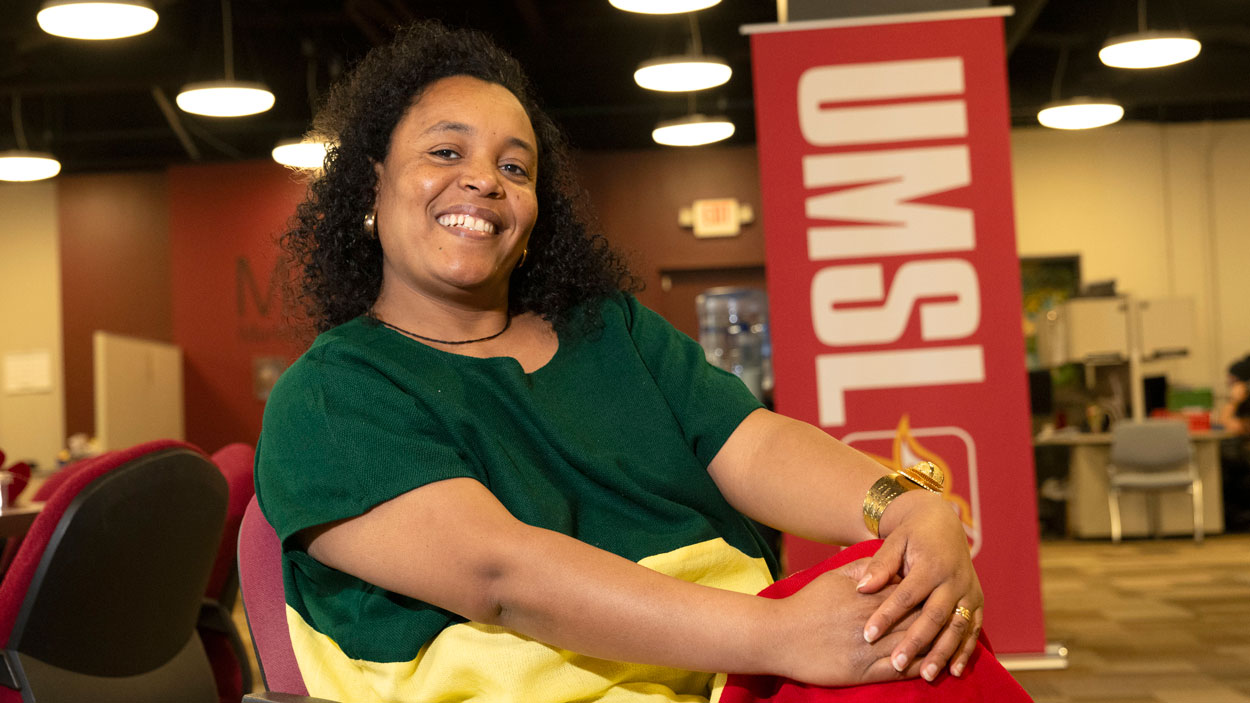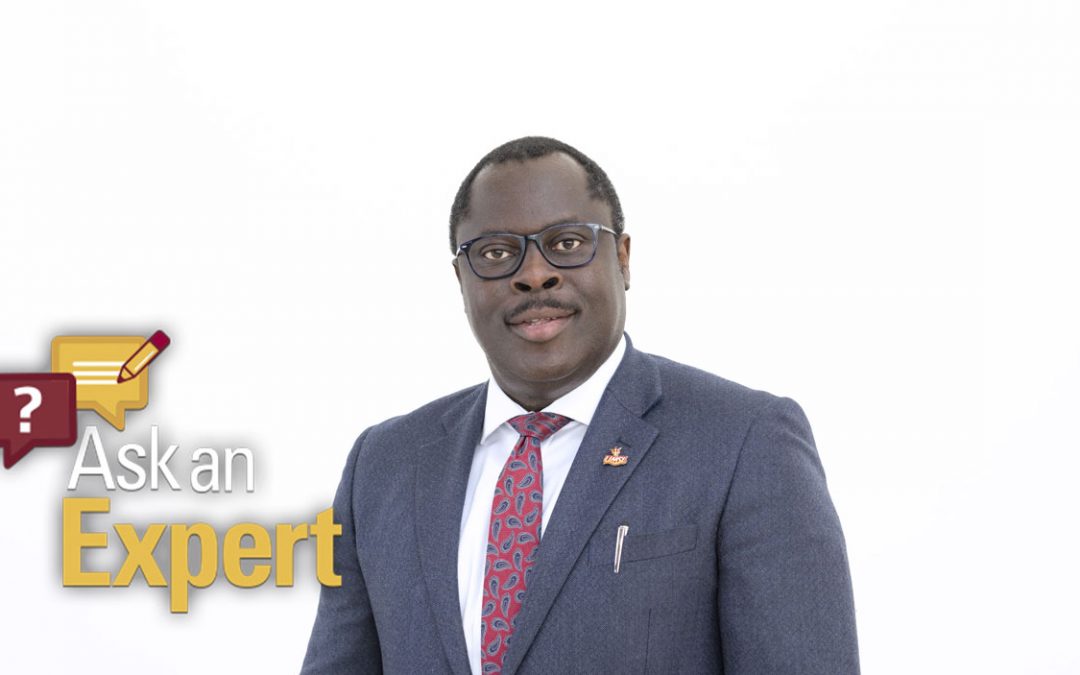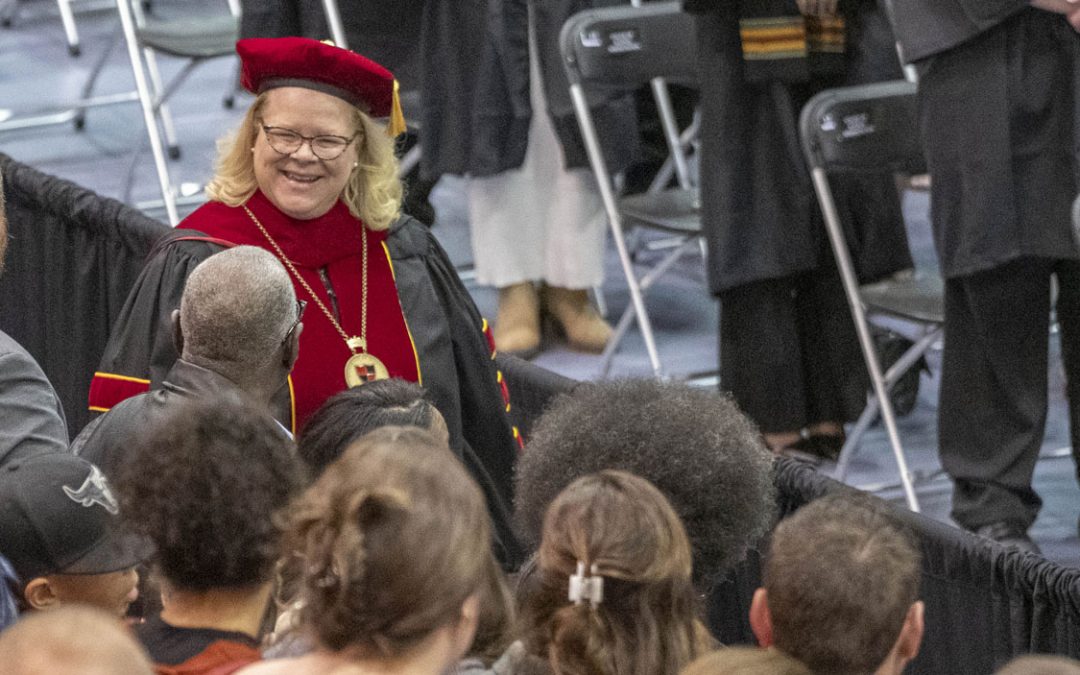
Teamir Melaku left Ethiopia at the age of 20 to come to the United States. After moving across the country twice, she enrolled at UMSL to pursue a career in education. In May, she will graduate from the College of Education with a bachelor’s degree in elementary education with an emphasis in teaching English to speakers of other languages (TESOL). (Photo by Derik Holtmann)
Teamir Melaku remembers listening intently as Barack Obama delivered his first speech after winning the 2008 presidential election. It was as if he was speaking directly to her.
“I was there; I was sitting on the floor,” she recalled. “I was listening to him, and then he said, ‘Yes, we can! Yes, we can!’ He said it so many times. I save in my head those words. So, I said, ‘Yes, I can.’ I can do something. I can go to school. I can change my life.”
Those inspiring words set Melaku on a winding path to transform her life. The twists and turns included becoming a certified nurse assistant, earning an early childhood education certificate and moving across the country twice.
The journey will have been worth it this May when Melaku achieves her dream and graduates from the University of Missouri–St. Louis College of Education with a bachelor’s degree in elementary education with an emphasis in special education and teaching English to speakers of other languages (TESOL).
“Passion leads me to my dream in wanting to become a teacher,” Melaku said. “I always taught myself once I become a teacher, I would be the kind of teacher that always settles for more, aiming for the opportunity to impart knowledge to my future students from what I’ve gained through my schooling. I want to be a teacher not just to teach but to look for the beauty that lies in the growth of every student. As a future teacher, I intend to provide a safe learning environment wherein, they’re enabled to embrace the beauty of learning.”
Melaku is a native of Ethiopia, and as a child, she loved school. Her family and church were early positive influences. Melaku’s father was a math teacher, beloved by children in the community. Before entering kindergarten, she began learning the basics of reading and writing via the Bible. Growing up in Sunday School influenced her behaviorally and academically, teaching her patience, resilience and diligence.
However, a career in education was many years and an ocean away.
A new life
At the age of 20, Melaku made the difficult decision to leave her home in east Africa and immigrate to the United States to pursue a better future. In 2006, she joined her uncle in Chicago, where she attended community college to learn English and started working as a credit card processor.
Adjusting to life in a new country and culture wasn’t easy. Melaku often missed the hallmarks of Ethiopian culture – the spicy, flavorful cuisine; vibrant traditional clothes; daily church services and strong social bonds.
“I lived with a big family in my country,” she said. “I missed my family, my church, my social life. It was very hard for me. It was hard to find friends, like Ethiopian friends.”
Melaku was a star employee, winning recognition for her performance routinely. Her first pregnancy wasn’t an issue at work, but her second coincided with the appointment of a new manager. He saw things differently.
The workplace environment became fraught after Melaku informed her new boss of her doctor’s recommendation for six weeks of maternity leave. He balked at the idea and insisted two weeks was plenty of time. He also suggested she put the newborn in daycare, even though many experts don’t recommend doing so until 12 months.
“After I had the baby, he called me,” she said. “After three days, he called me, and asked, ‘Are you gonna come back?’ I said, ‘No.’ The next day, he sent to me a letter, he fired me.”
Left with little recourse, Melaku applied for, and received, unemployment. But President Obama’s words were still echoing in her mind, and she decided to make a change.
A new journey
Melaku became a certified nurse assistant and found a job at a children’s hospital working the night shift. Around that time, she was also able to bring her husband to the U.S. The couple agreed that he would go to school for computer science in Seattle, while Melaku worked and cared for their children in Chicago.
However, the work at the children’s hospital took a toll.
“The main thing was, when I saw the suffering kids, I was crying,” Melaku said. “I was crying every day. I said, ‘I don’t want to be a nurse.’ I don’t like to see when kids are suffering. I decided my passion is to work with kids. I started thinking, ‘OK, what am I going to do?’”
When her husband completed his degree and found a job in Seattle, Melaku and their children joined him. The cross-country move provided an opportunity for Melaku to explore another avenue to work with children. She earned an early childhood education certificate and began teaching preschool.
Then her husband accepted a one-year contract job in North Carolina. Not wanting to disrupt the lives of the kids, the couple once again lived apart on opposite sides of the country. The family came together again after her husband found a full-time position in St. Louis.
Now it was Melaku’s turn to go to school.
Making a difference
Melaku sought the opinions of her friends and her children’s teachers about undergraduate education programs in the St. Louis area. They all made the same recommendation: UMSL. She took their advice, completing two years at St. Louis Community College–Forest Park before transferring to UMSL. She found an incredibly supportive community in the College of Education.
The college’s friendly, organized staff and faculty members were ready to answer Melaku’s questions and help her at a moment’s notice. She recalled Erika Rose, student support specialist in clinical experience, dropping everything to help her navigate the Missouri Department of Elementary and Secondary Education website.
It’s just one example of the generosity Melaku has experienced at the university.
“I love UMSL, to be honest,” she said. “We are like a family. The teachers are very supportive, especially for me. English is my second language. Sometimes I don’t understand their instruction because of my language. Then I say, ‘I don’t understand. Can you explain to me more?’ They respond to me, and they set up a time for me to talk in person, otherwise by Zoom.”
Additionally, Melaku acknowledges her advisor ShaQuina White; Christine Sykora, clinical education student support specialist; Katherine Brothers, adjunct instructor, and Stephanie Koscielski, director of clinical experiences and school partnerships, for their profound impact on her academic journey.
Despite the challenges of juggling family responsibilities and dealing with occasional language barriers, Melaku has excelled in her coursework and student teaching. Koscielski said Melaku’s commitment to her education is evident in her work.
“Teamir’s passion, joy and tenacity for teaching has allowed her to achieve her life goal of becoming a dedicated, accomplished teacher,” Koscielski said. “She has successfully balanced the nuances of being a mom and the only student at UMSL from Ethiopia with completing her certification program. All of us in the College of Education are extremely proud of her.”
Being in the classroom last semester reaffirmed Melaku’s passion for working with children. For her, patience and understanding has been the key to serving as an effective educator.
“Having patience is very important,” she said. “We don’t know these kids, how much they suffer outside. Maybe with their parent. Maybe with their friends. So, we have to understand this and have patience and give them time. Talk to them. Maybe they’re hungry. Maybe this kid is suffering right now. We have to understand and help them.”
Melaku believes taking the time to talk openly and honestly with students can make a true difference in their lives, and she feels blessed to be in a position to do so.
“I take seriously the task of turning young people into kind, thoughtful, and caring adults,” she said. “I have always been very grateful to my teachers and the education system for making me who I am today. I just hope that I can have the same positive impact on the minds and hearts of my future students.
“I hope I can create a safe place for my future students, where teamwork and empathy are rewarded as enthusiastically as a good test result. Through love and understanding, I think I can help students achieve their maximum potential.”
Looking back on her journey, Melaku is thankful for her family’s support – especially her sisters Hannah Birhanu and Dina Gelaye who have helped her along the way – and also for President Obama’s words, which inspired her to change her circumstances. She hopes he’ll even be able to take part in her accomplishment this spring.
“I have a plan to invite him for my graduation,” she said. “I don’t know if he’s coming or not. My daughter said, ‘He needs to see this.’ So, we have a plan.”














